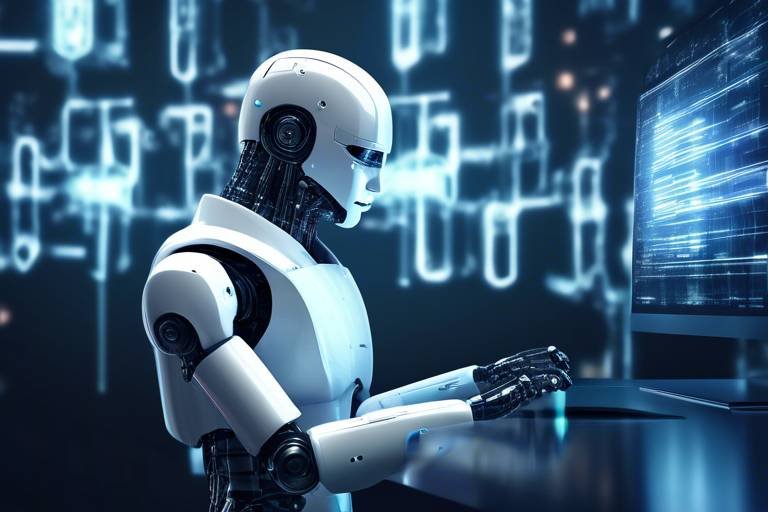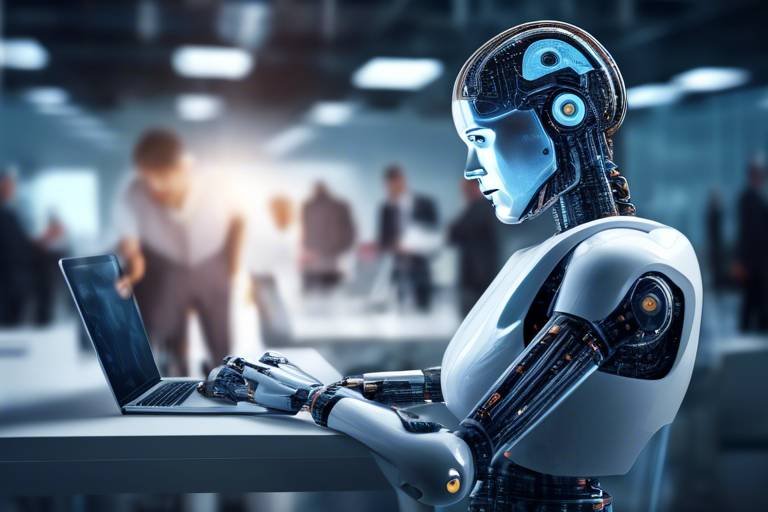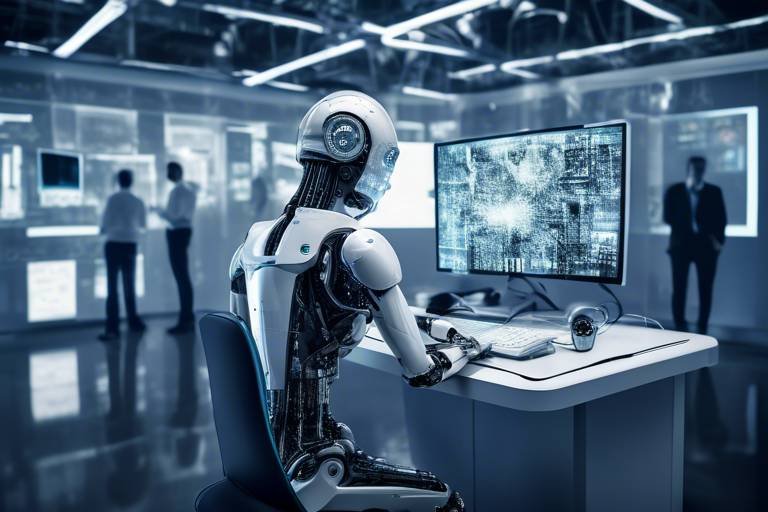Ensuring Job Security in an AI-Dominant Future
In today's rapidly evolving world, the rise of artificial intelligence (AI) is reshaping the landscape of employment in ways we could only imagine a few years ago. As machines become smarter and more capable, many people find themselves asking: "What does this mean for my job?" The truth is, while AI presents challenges, it also opens up a plethora of opportunities for those willing to adapt. In this article, we'll explore the implications of AI on employment, examine strategies to secure jobs, and discuss how both individuals and organizations can thrive in this new era of work.
Understanding how AI technologies are reshaping various industries is crucial for anticipating job market changes and identifying opportunities for growth and adaptation in the workforce. From manufacturing to healthcare, AI is streamlining processes, increasing efficiency, and even creating new roles that didn’t exist a decade ago. However, this transformation also means that some jobs may become obsolete, leading to widespread concern about job security. It's essential to recognize that while certain tasks may be automated, the human touch remains irreplaceable. For instance, while AI can analyze data faster than any human, it lacks the emotional intelligence to connect with clients or understand nuanced human interactions.
As AI continues to evolve, certain skills will become increasingly valuable. The key to remaining competitive in an AI-driven job market lies in developing a diverse skill set that combines both technical and soft skills. In this section, we’ll highlight the essential skills that workers should focus on to ensure their employability in the future.
Technical proficiency in areas like data analysis, programming, and AI system management will be vital for future job seekers. With the growing demand for tech-savvy individuals, acquiring these skills can significantly enhance career advancement opportunities. Think of technical skills as the toolbox you need to navigate the AI landscape. Without them, you might find it challenging to build a successful career in this new environment.
Data literacy will be crucial in interpreting and utilizing data effectively. In an AI-enhanced workplace, understanding how to analyze data can lead to better decision-making and improved outcomes. Employers are increasingly looking for individuals who can not only collect data but also derive meaningful insights from it. Imagine being able to turn numbers into narratives; that’s the power of data literacy!
Familiarity with programming languages can open doors to numerous career opportunities. As AI technologies become more integrated into various sectors, coding skills will be highly sought after. Learning languages like Python or JavaScript can set you apart in the job market. It’s like learning a new language that allows you to communicate with machines effectively!
In addition to technical skills, soft skills such as communication, creativity, and critical thinking are becoming increasingly important. These skills can enhance employability in an AI-centric world. For instance, while AI can analyze data, it cannot replicate the creativity needed to develop innovative solutions or the empathy required to understand customer needs. Employers are looking for individuals who can think outside the box and collaborate effectively with others.
Embracing change is vital for job security in an AI-dominated environment. The ability to adapt to new technologies and work processes is essential for both individuals and organizations. Here are a few strategies to consider:
- Continuous Learning: Lifelong learning is essential for staying relevant in the workforce. This means actively seeking out new knowledge and skills, whether through formal education or self-directed learning.
- Networking and Collaboration: Building professional networks and collaborating with others can provide support and opportunities. Networking can enhance job security in an evolving job market by connecting you with potential employers and mentors.
Organizations play a significant role in ensuring job security for their employees. By fostering a culture of adaptability and supporting workforce development, companies can help their teams thrive in an AI-driven future. For example, implementing reskilling initiatives can help employees transition to new roles as their current positions evolve or become obsolete. This not only benefits the employees but also enhances the organization’s overall productivity and innovation.
Implementing reskilling programs can help employees transition to new roles. As technology evolves, companies that invest in their workforce will be better positioned to succeed. Reskilling initiatives can include workshops, online courses, and mentorship programs that equip employees with the necessary skills to navigate the changing job market.
Encouraging a culture of innovation can lead to new job creation. Organizations that foster creativity and adaptability are more likely to thrive in an AI-driven future. By creating an environment where employees feel empowered to share their ideas and take risks, companies can cultivate a workforce that's not only resilient but also ready to tackle the challenges of tomorrow.
- Will AI take away all jobs? While AI will automate certain tasks, it will also create new job opportunities that require human skills.
- What skills should I focus on developing? Focus on both technical skills, such as data analysis and programming, and soft skills like communication and creativity.
- How can organizations support their employees during this transition? Organizations can implement reskilling initiatives and foster a culture of innovation to help employees adapt to changes.

The Impact of AI on Employment
As we stand on the brink of a technological revolution, the impact of artificial intelligence (AI) on employment is nothing short of profound. The way we work is evolving at an unprecedented pace, and understanding these changes is crucial for both individuals and organizations. AI is not merely a tool; it’s a transformative force reshaping industries and redefining job roles. Imagine walking into a future where machines handle repetitive tasks with incredible efficiency, leaving humans to focus on more complex, creative endeavors. This shift is not just a possibility; it's already happening!
In various sectors—from manufacturing to healthcare and finance—AI technologies are being integrated to enhance productivity and streamline operations. For instance, in manufacturing, robots equipped with AI can perform assembly line tasks faster and with greater precision than human workers. In healthcare, AI algorithms analyze patient data to assist doctors in diagnosing diseases more accurately. This leads to a significant question: What does this mean for the workforce? While some jobs may be displaced, new opportunities will emerge, particularly in roles that require human judgment, creativity, and emotional intelligence.
To illustrate this impact, consider the following table that outlines how AI is influencing various job sectors:
| Industry | AI Application | Job Impact |
|---|---|---|
| Manufacturing | Robotics for assembly | Reduction in manual labor jobs, increase in tech support roles |
| Healthcare | Data analysis for diagnostics | Shift towards data management and patient care roles |
| Finance | Algorithmic trading | Decrease in traditional trading roles, rise in data analysts |
While the potential for job loss due to automation is a legitimate concern, it’s essential to recognize that AI also creates new roles and opportunities. Think of it this way: just as the rise of the internet transformed the job landscape in the late 20th century, AI is poised to do the same in the 21st century. The key lies in our ability to adapt and evolve alongside these technologies.
Moreover, it’s not just about the jobs that may disappear; it’s also about the skills that will be in demand. As AI takes over routine tasks, there will be a greater need for employees who can work alongside these technologies, leveraging them to enhance productivity and innovation. This means that understanding AI and its applications will become a fundamental requirement for many roles.
In conclusion, the impact of AI on employment is multifaceted. While it brings challenges, it also opens doors to new possibilities. The workforce must be prepared to embrace this change, focusing on acquiring the skills and knowledge necessary to thrive in an AI-driven world. So, as we look ahead, let’s ask ourselves: are we ready to adapt and seize the opportunities that lie ahead?

Skills for the Future
As we venture deeper into the realm of artificial intelligence, it’s becoming increasingly clear that certain skills will be paramount for success in the job market. The landscape of work is evolving, and with it, the requirements for what makes an employee valuable. So, what skills should we focus on to ensure we remain competitive? Let’s break this down into two main categories: technical skills and soft skills.
Technical skills are the backbone of the future workforce. Proficiency in areas such as data analysis, programming, and AI system management will not only enhance your employability but also position you as a leader in your field. Imagine navigating through a sea of data and being able to extract meaningful insights that drive business decisions. This is where data literacy comes into play. In an AI-enhanced workplace, understanding how to interpret and utilize data effectively is crucial. It’s not just about crunching numbers; it’s about making informed decisions that can propel your organization forward.
Moreover, having a solid grasp of programming knowledge can open doors to numerous career opportunities. In a world where technology is king, familiarity with programming languages like Python, Java, or R can set you apart from the competition. Think of it this way: coding is like learning a new language. The more fluent you are, the better you can communicate with the machines that are increasingly taking center stage in our work lives.
But let’s not forget about soft skills, which are becoming just as critical as technical expertise. Skills such as communication, creativity, and critical thinking are essential in an AI-centric world. Consider this: while machines can process data rapidly, they lack the human touch. This is where your ability to communicate ideas clearly and creatively comes into play. Employers are on the lookout for individuals who can think outside the box and provide innovative solutions to complex problems.
In summary, to thrive in an AI-driven job market, individuals must cultivate a blend of both technical and soft skills. As we move towards a future dominated by artificial intelligence, remember that the human element is irreplaceable. Embrace the challenge of learning new skills and adapting to change, and you will not only secure your place in the workforce but also pave the way for a fulfilling career.
- What are the most important technical skills to learn for the future?
Data analysis, programming, and AI system management are crucial for success in an AI-driven job market. - How can I improve my soft skills?
Engage in activities that require teamwork, practice public speaking, and seek feedback to enhance your communication and critical thinking abilities. - Is it too late to learn new skills?
Absolutely not! Lifelong learning is key to staying relevant, and there are numerous resources available online to help you acquire new skills.

Technical Skills
In today's rapidly evolving job market, possessing is not just an advantage; it's a necessity. As artificial intelligence (AI) continues to permeate various sectors, the demand for individuals who can navigate this technological landscape is skyrocketing. Think of technical skills as your toolkit for the future—without the right tools, you can't build anything substantial. So, what exactly does this toolkit include? Let's dive in.
First and foremost, data analysis stands out as a critical skill. In an age where data is dubbed the new oil, being able to analyze and interpret data effectively can set you apart from the competition. Companies are increasingly relying on data-driven decisions, and those who can sift through the numbers and extract actionable insights will be invaluable. Imagine being the person who turns raw data into compelling stories that drive business strategy—exciting, right?
Next up is programming knowledge. Whether you're coding a simple website or developing complex algorithms for AI systems, understanding programming languages like Python, Java, or R can significantly enhance your career prospects. Coding is akin to learning a new language; once you grasp the syntax and structure, you unlock a world of possibilities. Employers are on the lookout for candidates who can not only use existing software but also create new solutions tailored to their specific needs.
Moreover, managing AI systems is becoming increasingly important. As businesses adopt AI technologies, they need professionals who can oversee these systems, ensuring they operate smoothly and efficiently. This is where skills in AI system management come into play. By developing a solid understanding of AI frameworks and tools, you position yourself as a key player in the workforce, capable of bridging the gap between technology and business.
In summary, the technical skills landscape is vast and ever-changing. To remain competitive, individuals must not only acquire these skills but also stay updated with the latest advancements. Embracing a mindset of continuous learning will empower you to adapt and thrive in this AI-driven world. So, gear up, equip yourself with these essential tools, and get ready to build your future!
Q1: What are the most important technical skills to learn for an AI-driven job market?
A1: The most important technical skills include data analysis, programming knowledge, and AI system management. Mastering these areas will help you stand out in the evolving job landscape.
Q2: How can I start learning these technical skills?
A2: There are numerous online platforms like Coursera, edX, and Udacity that offer courses in data analysis and programming. Additionally, participating in coding bootcamps can provide hands-on experience.
Q3: Is it necessary to have a degree in computer science to acquire technical skills?
A3: While a degree can be beneficial, it is not mandatory. Many successful professionals are self-taught or have gained skills through online courses and practical experience.

Data Literacy
In today's fast-paced, technology-driven world, has emerged as a cornerstone of professional competence. But what exactly does it mean to be data literate? Simply put, it refers to the ability to read, understand, create, and communicate data as information. As organizations increasingly rely on data to make informed decisions, the demand for employees who can navigate this landscape effectively is skyrocketing. Imagine walking into a meeting where everyone is discussing complex data sets, and you’re the only one who can interpret the trends and insights. Suddenly, you become the go-to person, the one who adds immense value to the team.
Data literacy is not just about crunching numbers; it’s about making sense of them and using that understanding to drive strategic decisions. In an AI-enhanced workplace, where algorithms and machine learning are used to analyze massive datasets, having the ability to interpret the results is crucial. For example, if a marketing team utilizes AI to analyze customer behavior, a data-literate employee can identify actionable insights that can lead to targeted campaigns. Without this skill, organizations risk making decisions based on misinterpretations or incomplete data.
Moreover, data literacy encompasses a broad range of competencies. Here are some key elements that contribute to a data-literate workforce:
- Understanding Data Sources: Knowing where data comes from and how it is generated is fundamental. This includes awareness of both quantitative and qualitative data.
- Data Interpretation: The ability to analyze data trends and patterns is essential for drawing meaningful conclusions.
- Data Visualization: Being able to present data in a visually compelling way helps in communicating insights to stakeholders effectively.
- Critical Thinking: A data-literate individual must question data validity and reliability, ensuring that conclusions drawn are based on solid evidence.
Incorporating data literacy into your skill set not only enhances your employability but also empowers you to contribute to your organization’s success. Companies that prioritize data literacy are better positioned to innovate and adapt to market changes. They can leverage data to identify new opportunities, optimize processes, and improve customer experiences. As the saying goes, "Data is the new oil," and being able to refine it into actionable insights is what sets you apart in the job market.
In conclusion, as we move deeper into an AI-dominant future, investing time in developing your data literacy skills will be one of the smartest career moves you can make. Whether you’re a seasoned professional or just starting, embracing data as a fundamental component of your work will not only ensure your relevance in the job market but also enhance your ability to make informed decisions that drive success.
Q1: What is data literacy?
A1: Data literacy is the ability to read, understand, create, and communicate data as information. It involves interpreting data and using it to inform decisions.
Q2: Why is data literacy important in the workplace?
A2: In an AI-driven environment, data literacy enables employees to extract insights from data, leading to better decision-making and strategic planning.
Q3: How can I improve my data literacy skills?
A3: You can improve your data literacy by taking online courses, attending workshops, practicing data analysis, and staying updated on data trends and tools.
Q4: Is data literacy only for technical roles?
A4: No, data literacy is valuable across all roles and industries. Everyone can benefit from understanding data, regardless of their job function.

Programming Knowledge
In today's rapidly evolving job market, has emerged as a critical skill for anyone looking to thrive in an AI-centric world. Think of programming as the new literacy—just like reading and writing were essential in the past, coding has become a fundamental skill that empowers individuals to interact with technology on a deeper level. The ability to understand and write code opens up a plethora of opportunities, from developing software applications to automating processes that can save time and resources.
Learning programming languages such as Python, Java, or JavaScript not only enhances your employability but also equips you with the tools to innovate and create. For instance, Python is widely recognized for its simplicity and versatility, making it an excellent choice for beginners. It is extensively used in data analysis, machine learning, and web development, which means that mastering this language can place you at the forefront of technological advancements.
Moreover, having a solid grasp of programming allows you to communicate effectively with technical teams, bridging the gap between non-technical and technical roles. This is especially important in collaborative environments where understanding the basics of coding can facilitate smoother project management and execution. As the demand for tech-savvy professionals continues to rise, those with programming skills will undoubtedly stand out in the crowd.
Here's a quick overview of some popular programming languages and their applications:
| Programming Language | Primary Use |
|---|---|
| Python | Data Science, AI, Web Development |
| Java | Enterprise Applications, Android Development |
| JavaScript | Web Development, Interactive Websites |
| C# | Game Development, Windows Applications |
In conclusion, programming knowledge is not just a nice-to-have; it's a must-have in the current landscape. Whether you’re a seasoned professional or just starting your career, investing time in learning programming can significantly enhance your job security and career prospects. So, why not dive into the world of coding today? It might just be the key to unlocking your potential in an AI-dominated future.
- What programming language should I start with? Python is often recommended for beginners due to its readability and versatility.
- How long does it take to learn programming? It varies by individual, but with consistent practice, you can grasp the basics in a few months.
- Do I need a degree to work in programming? No, many successful programmers are self-taught and have built their skills through online resources and projects.
- Can programming skills help in non-tech jobs? Absolutely! Understanding programming can enhance your problem-solving skills and make you more valuable in various roles.

Soft Skills
In today's rapidly changing job market, the focus isn't solely on technical prowess. While having a strong foundation in technical skills is essential, are emerging as the secret sauce that can elevate an employee from being just competent to truly exceptional. But what exactly are soft skills? Think of them as the interpersonal skills that enable individuals to communicate effectively, collaborate with others, and navigate the complexities of the workplace. In a world increasingly dominated by artificial intelligence, these skills are not just nice to have; they are essential for ensuring job security and career advancement.
Consider this: when machines can perform tasks with precision and speed, the human touch becomes invaluable. Skills like communication, creativity, and critical thinking are what set humans apart from machines. For instance, while AI can analyze vast amounts of data, it lacks the ability to empathize or understand the emotional nuances of human interactions. This is where effective communication comes into play. Being able to articulate ideas clearly and persuasively can make a significant difference in how one is perceived in the workplace.
Moreover, creativity is another soft skill that is becoming increasingly important. In an AI-driven world, companies are looking for individuals who can think outside the box and come up with innovative solutions to complex problems. This is not just about artistic creativity; it's about being able to approach challenges from different angles and devise strategies that machines simply cannot. For example, a team that can brainstorm creative marketing strategies will outperform one that relies solely on data-driven methods.
Critical thinking is yet another soft skill that deserves attention. In an era where information is abundant, the ability to analyze and evaluate data critically is crucial. Employers value individuals who can sift through information, identify biases, and make informed decisions. This skill enables workers to adapt quickly to changes and challenges, making them indispensable in the workplace.
To sum it up, while technical skills may get your foot in the door, it’s the soft skills that will help you climb the ladder of success. Here’s a quick overview of why soft skills matter:
- Enhances teamwork: Good communication fosters collaboration.
- Drives innovation: Creativity leads to new ideas and solutions.
- Improves adaptability: Critical thinking helps navigate change.
As we move further into the AI-dominated future, it's clear that soft skills will play a pivotal role in job security. Those who invest in developing these skills will not only enhance their employability but also ensure they remain relevant in a workforce that increasingly values human insight and interaction.

Adapting to Change
In today's fast-paced world, especially with the rise of artificial intelligence, is not just a luxury; it's a necessity. Think about it: the job landscape is shifting beneath our feet, and those who can’t keep up will find themselves left behind. Imagine standing on a beach, watching the tide come in. The waves of technological advancement are relentless, and if you don’t learn to ride those waves, you might just get swept away. So, how do we ensure that we not only survive but thrive in this new environment?
First and foremost, embracing change means having a mindset geared towards flexibility and growth. This involves being open to new ideas, technologies, and ways of working. For individuals, this could mean taking the initiative to learn new skills or seeking out opportunities that push you out of your comfort zone. For organizations, it’s about fostering a culture where experimentation is encouraged, and failure is seen as a stepping stone to success. After all, every great innovation has been birthed from trial and error.
One of the most effective strategies for adapting to change is continuous learning. In an AI-dominated world, the only constant is change itself. Lifelong learning should become a core principle for both employees and employers. This could take many forms, such as online courses, workshops, or even informal learning through peer interactions. The key is to stay curious and proactive. For instance, a recent survey found that companies investing in employee training saw a 25% increase in productivity. That’s a win-win!
Moreover, networking and collaboration play a pivotal role in adaptation. Building a strong professional network can provide support and open doors to new opportunities. It’s like having a safety net; when the ground shifts, you have people to catch you. Engaging with others in your field, whether through industry events or online forums, can spark innovative ideas and help you stay abreast of the latest trends. Remember, it’s not just about what you know but also who you know. A well-connected individual is often better positioned to navigate the complexities of an evolving job market.
Organizations themselves must also adapt to these changes. This means implementing reskilling initiatives that allow employees to transition into new roles as the demand for certain skills evolves. Companies that invest in their workforce are not just protecting their employees; they are also securing their own future. For example, a tech firm that recognizes the need for data analysts might offer training programs to help existing staff make the switch. This not only boosts morale but also enhances overall company performance.
Finally, fostering a culture of innovation is crucial. Organizations should encourage employees to think creatively and propose new ideas. This can lead to the development of new products and services, ultimately resulting in job creation. Think of it like a garden; if you nurture your plants (or in this case, your employees), they will flourish and produce fruit. Companies that prioritize innovation are often the ones that thrive, even in turbulent times.
In conclusion, adapting to change is not merely about survival; it's about embracing the future with open arms. Whether you're an individual looking to secure your position in the workforce or an organization striving to stay ahead of the curve, the key lies in being proactive, continuously learning, and fostering a collaborative environment. As we move forward into an AI-driven world, those who can adapt will not just survive—they will thrive.
- What is the best way to start adapting to change?
Begin by cultivating a growth mindset and seeking out learning opportunities that challenge you. - How can organizations support their employees in adapting to change?
Implement reskilling initiatives and encourage a culture of innovation and collaboration. - Why is networking important in an AI-dominated job market?
Networking helps you stay informed about industry trends and opens up new opportunities for career advancement.

Continuous Learning
In today's fast-paced world, where technology is evolving at lightning speed, has become more than just a buzzword; it's a necessity. The job market is transforming, and with the rise of artificial intelligence, the skills that were once in high demand can quickly become obsolete. So, how do we keep our heads above water in this ever-changing sea of technology? The answer lies in embracing a mindset of lifelong learning. Think of it as a marathon rather than a sprint; it’s about pace, consistency, and the determination to keep going, no matter the obstacles.
Continuous learning can take many forms, from formal education and online courses to self-directed study and hands-on experience. For instance, platforms like Coursera, Udacity, and LinkedIn Learning offer a plethora of courses that cater to various interests and skill levels. Whether you're looking to dive into data science, master a new programming language, or enhance your leadership skills, these resources are at your fingertips. The key is to regularly assess your skills and identify areas where you can improve or expand your knowledge base.
Moreover, incorporating learning into your daily routine can make a significant difference. Consider setting aside a specific time each week dedicated to learning something new. This could mean reading industry-related articles, watching educational videos, or participating in webinars. By integrating learning into your schedule, it becomes a habit rather than a chore. Remember, every little bit counts! Just like a puzzle, each piece of knowledge you gain contributes to the bigger picture of your career development.
Another vital aspect of continuous learning is seeking feedback and mentorship. Engaging with colleagues and industry professionals can provide you with valuable insights and perspectives that you might not have considered. Don't hesitate to ask for feedback on your work or seek advice on your career path. This interaction can not only enhance your skills but also broaden your professional network, opening doors to new opportunities. Think of it as having a compass in a dense forest; the right guidance can lead you to the right path.
In the workplace, organizations can foster a culture of continuous learning by encouraging employees to pursue professional development. This might include offering training programs, workshops, or even tuition reimbursement for further education. When companies invest in their employees' growth, it not only enhances job satisfaction but also boosts productivity and innovation. After all, a workforce that is continuously learning is a workforce that is prepared for the future.
In summary, continuous learning is not just a personal responsibility; it’s a collaborative effort between individuals and organizations. By embracing this approach, you can ensure that you remain relevant and competitive in an AI-dominated job market. So, are you ready to embark on this journey of lifelong learning?
- What is continuous learning? Continuous learning refers to the ongoing, voluntary, and self-motivated pursuit of knowledge for personal or professional development.
- Why is continuous learning important in an AI-driven world? Continuous learning helps individuals stay relevant, adapt to new technologies, and enhance their skills to meet the demands of the evolving job market.
- How can I incorporate continuous learning into my routine? You can set aside specific times for learning, take online courses, read articles, and seek mentorship or feedback from colleagues.
- What role do organizations play in promoting continuous learning? Organizations can support continuous learning by offering training programs, workshops, and resources for professional development.

Networking and Collaboration
In today's fast-paced, AI-driven world, networking and collaboration are not just buzzwords; they are essential components for ensuring job security and career growth. Imagine walking into a room full of professionals, each with their unique skills and experiences. By connecting with them, you open up a treasure trove of opportunities that can lead to new projects, job offers, and invaluable insights into industry trends. But how do you effectively network in an era where technology often replaces face-to-face interactions?
First and foremost, leveraging online platforms is key. Websites like LinkedIn allow you to connect with industry leaders and peers, share your accomplishments, and even join discussions in relevant groups. These online interactions can lead to real-world connections, making it easier to find mentors or collaborators. Consider this: building a strong online presence is akin to creating a digital resume that showcases your skills and interests to a wider audience.
Moreover, attending industry conferences and workshops can significantly enhance your networking efforts. These events are not just about learning; they are fertile ground for meeting like-minded individuals who can inspire and support your career journey. Think of these gatherings as a marketplace of ideas where you can exchange knowledge and explore potential collaborations. When you engage in conversations, remember to listen actively and ask questions. This not only shows your interest but can also lead to deeper connections.
Collaboration is equally important. In a world where AI is transforming how we work, the ability to collaborate effectively with others can set you apart from the competition. Whether it's working on a team project or partnering with colleagues on innovative ideas, embracing a collaborative mindset fosters creativity and problem-solving. It's like being part of a symphony: every instrument contributes to a beautiful piece of music, and each person's unique talents can harmonize to create something extraordinary.
To further illustrate the importance of networking and collaboration, consider these key benefits:
- Access to Opportunities: Networking opens doors to job openings and projects that may not be advertised.
- Knowledge Sharing: Collaborating with others allows you to gain new perspectives and insights.
- Support System: Building a network provides emotional and professional support during career transitions.
- Increased Visibility: Engaging with others enhances your profile within your industry.
In summary, networking and collaboration are not just strategies for career advancement; they are essential practices for thriving in an AI-dominated job market. By actively engaging with others and embracing opportunities for collaboration, you can enhance your employability and ensure your skills remain relevant in a rapidly changing world. So, get out there, connect, and collaborate—your future self will thank you!
- What are the best platforms for networking?
LinkedIn, Meetup, and industry-specific forums are great for connecting with professionals.
- How can I improve my collaboration skills?
Practice active listening, be open to feedback, and engage in team projects to enhance your skills.
- Is networking only for job seekers?
No, networking is beneficial for anyone looking to grow professionally, share knowledge, or find mentorship.

The Role of Organizations
Organizations are not just the backbone of the economy; they are also pivotal in ensuring job security for their employees in an increasingly AI-dominated landscape. As we navigate through these transformative times, companies must recognize their responsibility to foster an environment where adaptability and growth are prioritized. This is not merely a trend; it's a necessity for survival in a world where technology is evolving at breakneck speed.
One of the primary ways organizations can support their workforce is through reskilling initiatives. As AI technologies automate routine tasks, many employees may find their roles becoming obsolete. However, companies that invest in reskilling programs can help their employees transition into new roles that leverage their existing knowledge while equipping them with the skills needed for the future. For instance, a manufacturing firm might offer training in AI system management to its assembly line workers, enabling them to oversee and optimize automated processes. This not only enhances employee satisfaction but also boosts productivity and loyalty.
Moreover, organizations that emphasize a culture of innovation are more likely to thrive in this new era. By encouraging creativity and allowing room for experimentation, companies can foster an environment where new ideas can flourish. For example, tech giants like Google and Apple have thrived by creating spaces where employees feel free to innovate. This approach can lead to the development of new products and services, which, in turn, can create new job opportunities. A culture that celebrates innovation not only attracts top talent but also retains existing employees who feel valued and engaged.
Additionally, organizations should focus on building a robust support system for their employees. This includes providing access to ongoing education and training resources. When companies offer workshops, online courses, or even partnerships with educational institutions, they empower their workforce to take charge of their professional development. Such initiatives can significantly enhance job satisfaction and retention rates, as employees feel that their growth is a priority for the organization.
In conclusion, the role of organizations in securing job stability in an AI-driven future cannot be overstated. By implementing reskilling programs, fostering a culture of innovation, and providing continuous learning opportunities, companies can not only safeguard their employees' futures but also ensure their own success in an ever-evolving marketplace. The future may be uncertain, but with the right strategies in place, organizations can lead the way in creating a resilient workforce.
- What can organizations do to help employees adapt to AI? Organizations can implement reskilling programs, foster a culture of innovation, and provide ongoing training opportunities.
- Why is reskilling important? Reskilling helps employees transition to new roles as technology evolves, ensuring they remain valuable assets to the company.
- How can a culture of innovation benefit a company? A culture of innovation encourages creativity, leading to new products and services, which can create additional job opportunities.
- What role does continuous learning play in job security? Continuous learning allows employees to stay relevant and competitive in the job market, adapting to new technologies and methodologies.

Reskilling Initiatives
In today's rapidly evolving job market, characterized by the relentless rise of artificial intelligence, have become not just beneficial but essential for both employees and organizations. As certain roles become obsolete, the ability to transition into new positions through reskilling can mean the difference between job security and unemployment. Organizations that proactively implement reskilling programs empower their workforce to adapt to technological changes, fostering a culture of resilience and innovation.
For example, consider a manufacturing company that traditionally relied on assembly line workers. With AI and automation taking over many of these tasks, the company can either watch its workforce dwindle or invest in . By offering training programs that teach employees how to operate and manage AI systems, the company not only retains valuable talent but also enhances its operational efficiency.
Moreover, reskilling initiatives can take various forms, including:
- Workshops and Training Sessions: These can be conducted in-house or through partnerships with educational institutions, focusing on the latest technologies and methodologies relevant to the industry.
- Online Courses: Many organizations are now leveraging online platforms to provide flexible learning opportunities, allowing employees to learn at their own pace.
- Mentorship Programs: Pairing less experienced employees with seasoned professionals can facilitate knowledge transfer and skill enhancement in a practical, hands-on manner.
To illustrate the impact of these initiatives, let's take a look at a recent study that highlights the benefits of reskilling:
| Company | Reskilling Program | Result |
|---|---|---|
| Tech Innovations Inc. | AI Management Training | 80% of participants transitioned to higher-skilled roles |
| Manufacturing Co. | Automation Operation Workshops | Increased productivity by 30% |
| Retail Solutions | Customer Service and AI Integration | Improved customer satisfaction ratings by 25% |
In conclusion, reskilling initiatives are a win-win for employees and organizations alike. They not only prepare the workforce for the challenges posed by AI but also create a more agile and innovative company culture. As we move further into an AI-dominant future, the organizations that prioritize reskilling will not just survive; they will thrive. The key takeaway is clear: investing in human capital is investing in the future.
- What are reskilling initiatives?
Reskilling initiatives are programs designed to help employees learn new skills or enhance existing ones to adapt to changing job requirements, especially due to technological advancements. - Why are reskilling initiatives important?
They are crucial for maintaining job security, improving employee morale, and ensuring that organizations remain competitive in a rapidly changing market. - How can employees benefit from reskilling?
Employees can enhance their employability, transition to new roles, and increase their job satisfaction through continued learning and skill development.

Emphasizing Innovation
In today's rapidly evolving landscape, innovation is not just a buzzword; it's a necessity for organizations striving to thrive in an AI-driven future. Companies that prioritize innovation are not merely adapting to change; they are actively shaping the future of work. But what does it mean to emphasize innovation in a corporate environment? It's about fostering a culture where creativity is not just encouraged but celebrated, where employees feel empowered to experiment and take risks without the fear of failure.
Imagine a workplace where ideas flow freely, where brainstorming sessions are a regular occurrence, and where every employee feels that their input is valued. This is the kind of environment that leads to groundbreaking solutions and new job creation. Organizations can take several steps to cultivate such a culture:
- Encourage Open Communication: Creating channels for employees to share their ideas and feedback can lead to unexpected innovations.
- Invest in Research and Development: Allocating resources towards R&D can help companies stay ahead of the curve and discover new markets.
- Provide Time for Creative Projects: Allowing employees to dedicate a portion of their workweek to passion projects can lead to significant breakthroughs.
Furthermore, organizations should recognize that innovation isn't just about new products or services; it's also about improving processes and enhancing customer experiences. For instance, companies can leverage AI technologies to streamline operations, reduce costs, and improve efficiency. By integrating AI into their workflows, businesses can free up human resources to focus on more strategic, creative tasks. This not only boosts productivity but also enhances job satisfaction among employees, as they engage in more meaningful work.
Moreover, fostering a culture of innovation can lead to a ripple effect that benefits the entire ecosystem. When companies innovate, they not only create new jobs within their organization but also stimulate growth in related sectors. For example, a tech company that develops a new software solution may inadvertently create demand for additional roles in customer support, sales, and marketing. This interconnectedness highlights the importance of innovation in driving overall economic growth.
In conclusion, emphasizing innovation is essential for organizations aiming to secure their place in an AI-dominant future. By nurturing a creative environment, investing in new technologies, and encouraging employees to think outside the box, companies can not only adapt to changing circumstances but also lead the charge in creating new opportunities. Ultimately, those who prioritize innovation will find themselves at the forefront of their industries, ready to tackle the challenges and seize the opportunities that lie ahead.
- What is the role of innovation in job security?
Innovation creates new roles and opportunities, helping organizations stay competitive and ensuring employees remain relevant in the workforce. - How can companies foster a culture of innovation?
By encouraging open communication, investing in R&D, and allowing time for creative projects, companies can cultivate an innovative environment. - Why is it important to integrate AI in the workplace?
Integrating AI can streamline operations, enhance efficiency, and allow employees to focus on more strategic tasks, ultimately improving job satisfaction.
Frequently Asked Questions
- How is AI affecting job security?
AI is transforming industries by automating tasks and changing the nature of jobs. While some positions may become obsolete, new roles are also emerging that require different skills. Understanding these changes is crucial for adapting and securing your job in the future.
- What skills should I develop to remain competitive?
To thrive in an AI-driven job market, focus on both technical and soft skills. Technical skills like data analysis, programming, and AI system management are essential. Meanwhile, soft skills such as communication, creativity, and critical thinking will enhance your employability and adaptability.
- Why is continuous learning important?
Continuous learning helps you stay relevant in a rapidly changing job market. Lifelong education and training allow you to adapt to new technologies and methodologies, ensuring that your skills remain in demand.
- How can networking help with job security?
Building a professional network opens doors to new opportunities and support. Networking can provide valuable insights into industry trends and job openings, making it easier to navigate changes in the job market.
- What role do organizations play in employee job security?
Organizations are crucial in fostering a culture of adaptability. By implementing reskilling initiatives and encouraging innovation, companies can help their employees transition to new roles and create new job opportunities.
- What is data literacy and why is it important?
Data literacy refers to the ability to read, understand, create, and communicate data. In an AI-enhanced workplace, being data literate is vital for making informed decisions and leveraging data for strategic advantages.
- How can I improve my programming skills?
Improving your programming skills can be achieved through online courses, coding bootcamps, or self-study. Practice regularly and work on projects that challenge you, as hands-on experience is one of the best ways to learn.
- What is the importance of innovation in the workplace?
Innovation drives new job creation and helps organizations stay competitive. By fostering a culture of creativity and encouraging employees to think outside the box, companies can adapt to changes and thrive in an AI-dominated future.



















